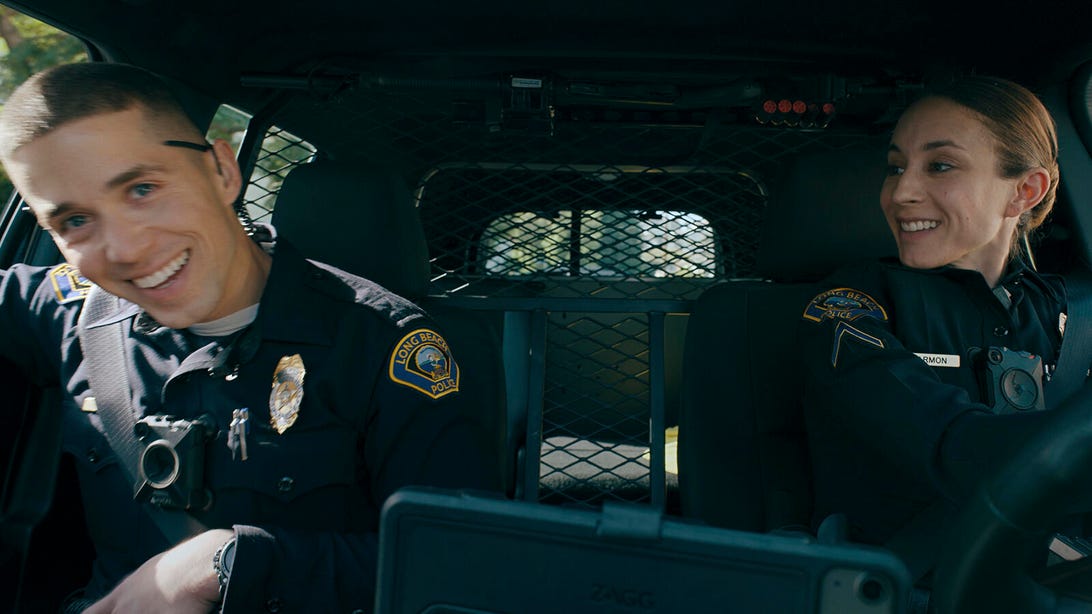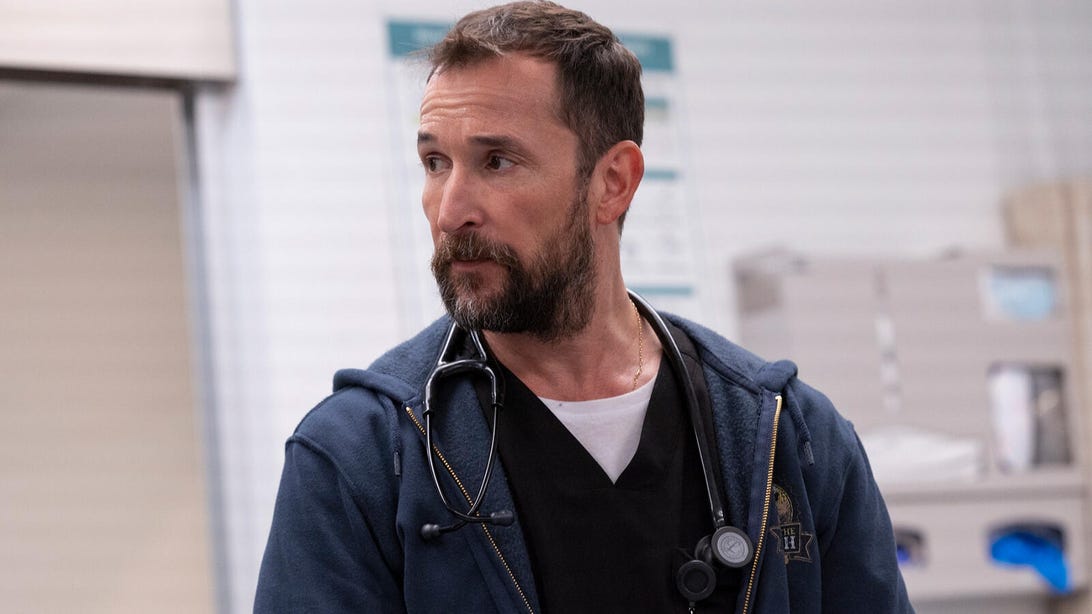Join or Sign In
Sign in to customize your TV listings
By joining TV Guide, you agree to our Terms of Use and acknowledge the data practices in our Privacy Policy.
On Call and The Pitt Suggest the Future of Television Looks a Lot Like Its Past
The first true streaming procedurals put a new spin on an old format

Troian Bellisario and Brandon Larracuente, On Call
Amazon MGM StudiosPeople who cover TV like to talk about the decline of linear TV and the rise of streaming, but they forget that broadcast procedurals are still massively popular. Network shows are consistently among the most-watched shows on streaming services. Audiences love lightly serialized dramas about cops or doctors doing their jobs, whether they're watching them weekly on CBS or binging them on Netflix.
The streaming services, however, have been noncommittal in their efforts to make their own versions of the kind of mass appeal police and medical dramas that have been television staples since the 1950s. There have been experimental toe-dips — Netflix picking up canceled broadcast dramas, for example, or Paramount+'s various streaming continuations, revivals, and spin-offs of shows that began on linear TV — but for the most part, streamers have been content to license these shows and devote their own studio resources to making shows that are more like something you'd see on cable, at least in terms of having a higher budget and lower episode count, if not necessarily in terms of quality. In other words, the streamers have been in the business of making Stranger Things, not NCIS.
But as streaming increasingly transitions from being an alternative to traditional television to simply being television, with commercials and live sports and other things you'd find on NBC, the streamers are starting to seriously explore making two of the most traditional forms of TV drama: police and medical procedurals. Two streaming services premiered their first procedurals on Jan. 9: Prime Video has the cop show On Call, and Max has the medical drama The Pitt. Both shows offer fascinating and instructive examples of how procedurals can work in a streaming context. They're also good shows that are worth watching on their own merits.
ALSO READ: The complete guide to winter TV
For help making their first procedurals, both streaming services enlisted the producers who know how to do it best. On Call is executive produced by Law & Order and One Chicago mastermind Dick Wolf and created by Chicago P.D. vet Tim Walsh and the boss' son Elliot Wolf, while The Pitt is executive produced by former ER showrunner John Wells, created by former ER writer R. Scott Gemmill, and stars former ER actor Noah Wyle, who also writes and executive produces. Thanks to their creative teams' experience and know-how, both shows are confident in their identities from the jump.
On Call is a half-hour drama set and filmed on location in Long Beach, Calif. It follows veteran patrol cop Traci Harmon (Troian Bellisario), and her trainee, rookie officer Alex Diaz (Brandon Larracuente), as she shows him the ropes of modern policing. That means dealing with staffing shortages, constant fentanyl-related crime, and civilians filming their every move. The series mixes traditional cinematography with found footage-style shots from cell phones, body cams, surveillance cameras, and other nontraditional, highly contemporary sources to give it a gritty, vérité feel. Director David Ayer's 2012 LAPD thriller End of Watch, which also uses this kind of cinematography, is a clear influence. The traditional cinematography also adds to the intensity, with snap zooms and unusual camera angles, and it's all heightened further with quick, high-energy editing.
While On Call does have an overarching season-long narrative revolving around Harmon and Diaz trying to catch the people responsible for the murder of a fellow officer, much of each episode is dedicated to standalone incidents where they show up and have to manage a crisis. The show moves at a breakneck pace; there are four incidents in the first episode alone. The constant action and short runtime means there's little room for extensive character development, and the characters remain fairly clichéd archetypes throughout the whole season. If you want characters to get invested in like SVU's Benson and Stabler, On Call will not satisfy you. But if you're looking for stripped-down, run-and-gun copaganda, On Call will keep your adrenaline pumping.
On Call is very intentional in its choices about being a stylistically different police procedural that's been optimized for streaming. In an interview with the New York Times, the Wolfs talked about how the half-hour procedural format differentiates On Call from both its broadcast siblings and serialized streaming dramas, and is better suited for younger people's attention spans. Being different in a genre that rewards familiarity may end up working against On Call, though. It doesn't have the comforting rhythm of a Law & Order show or the interpersonal dynamics of a One Chicago show, which are what viewers really prize in procedurals. On Call's first season is only eight episodes long, and if it gets renewed for more episodes in Season 2, which is what the Wolfs are hoping for, hopefully they use that extra time to go deeper into the characters. Season 1 doesn't have enough time to build familiarity with them. Characters are how viewers distinguish one procedural from another, not cinematography.

Noah Wyle, The Pitt
Warrick Page/MaxThe Pitt has no trouble with familiarity. It is so much like ER, the beloved, era-defining medical procedural that ran on NBC from 1994 to 2009, that Sherri Crichton, who controls the estate of ER creator Michael Crichton, filed a breach of contract lawsuit against The Pitt's producers for allegedly setting it up as an ER reboot, then changing it to be a new show at the last minute to cut her out of the deal. Warner Bros., the studio behind the series, denies this, basically arguing that every medical procedural is similar to every other medical procedural. Whether Crichton's claims are actionable is for the Hollywood attorneys of Suits LA to decide, but you barely have to squint to see Noah Wyle's veteran emergency room doctor Michael "Robby" Rabinavitch as Dr. John Carter, 30 years after he started out as a fresh-faced rookie, mentoring a new generation of medical students through their first day on the job, just like Carter in the ER pilot.
The show is set in an inner city teaching hospital in Pittsburgh over the course of a single 15-hour shift, 24 style. (The show's 15-episode season order — unusually long for a streaming show — and weekly release schedule also add to the traditional procedural feel.) The ER is a chaotic place, made even more chaotic by all the new young doctors and med students starting work on this particular day. The show follows them and the experienced doctors and nurses on the floor as they deal with whoever and whatever comes through the doors. There are thrilling wins and devastating losses, and every character deals with them in their own way. The characters here are much more well-drawn than they are on On Call, with Taylor Dearden's enthusiastic, awkward Dr. King and Isa Briones' cocky Dr. Santos as the standouts.
When it premiered, ER was the fastest-paced show TV had ever seen, with a new medical emergency every couple of scenes creating new opportunities for the actors to rapidly spout off medical jargon. The Pitt pushes the tempo even further. It moves at an unyielding pace with a nearly overwhelming level of sustained tension, and the jargon is so complex and delivered so quickly that the actors may as well be speaking a different language. But medical procedural fans will have no trouble following along as The Pitt hits the classic medical drama beats. When a likeable middle-aged man with abdominal pain gets told he's OK, you know he'll be dead by the end of the episode. The Pitt isn't reinventing the wheel, just refining it.
The commonalities between On Call and The Pitt could show the form of an emergent streaming procedural taking shape. If these two shows are setting a trend, streaming procedurals will have familiar plotlines and characters, but will take advantage of streaming's lack of restriction on graphic content. They'll be gorier and have more swear words, and they'll feel more grounded and realistic because of it. They'll engage with America's pressing crises of homelessness, mental illness, and drug addiction — and inspire you to keep Narcan on hand, because you might need it to save someone's life — but in a way that mostly avoids explicit political stances. (On Call has an old school sergeant played by ER alum Eriq La Salle complain that "everyone's so woke they don't want to put sh--heads in jail," while The Pitt has a young doctor played by Supriya Ganesh fight against racial disparities in healthcare, but neither show prioritizes these ideas.) They'll teach you the latest cop and medical jargon and show off the latest technology. They'll move at a pace fast enough to keep a viewer whose brain has been rotted by TikTok engaged. And they'll keep a tight focus on the workplace, deemphasizing the characters' lives off the job. Unlike most contemporary procedurals, On Call and The Pitt don't follow their characters home.
Beyond the things they have in common, though, On Call and The Pitt take strikingly different approaches to the new-old form of the streaming procedural. On Call is stylistically bold and narratively workmanlike, while The Pitt takes a formula that worked before and barely changes it. The Pitt is ultimately more successful because it's a higher quality show, with more nuanced writing and a more fleshed-out environment (the number of extras milling about in the background of every scene make the hospital feel alive and dynamic), but On Call is fresher and has more upside.
It's been over a decade since 30 Rock joked about TV executives trying to "make it 1997 again through science or magic," but that idea has never been more relevant than it is now. Producers whose first hits came out over 30 years ago are putting new spins on 70-year-old formats. The future looks a lot like the past, but with a shorter attention span and more blood.
All eight episodes of On Call Season 1 are now streaming on Amazon Prime Video. The first two episodes of The Pitt are streaming on Max, with new episodes premiering Thursdays.